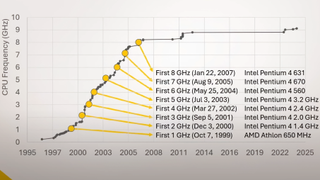Raptor Lake 9.1 GHz overclockers share secrets behind eclipsing a 17-year-old CPU frequency world record
Pieter from Skatterbencher and Jon from ElmorLabs discuss the historic achievement at Intel.

Not long ago, we covered a world record-breaking overclock of an Intel Core i9-14900KS reaching a whopping 9.1 GHz. In the time since, the team responsible were invited to Intel to hold an extended presentation on how they did it [h/t Skatterbencher]. It's also worth noting that this impressive 9.1 GHz overclock was only achieved on a single P-Core of the Core i9-14900KS CPU in question. The full video presentation is embedded below, and also includes additional historical context and technical information on the achievement.
During the presentation, the most important elements for achieving a world record in CPU overclocking runs are given. These include the use of liquid helium cooling instead of the more well-known and common liquid nitrogen, but also a combination of extreme temperature management and sheer luck that are very difficult, expensive, or both to reproduce. If you've heard of the "silicon lottery" for achieving stable CPU/GPU overclocks, that couldn't apply more to the arena of cutting-edge (but ultimately unstable in the long-term) OCs like this one. For example, the golden sample Core i9-14900KS being used is only 100 MHz better than other lottery "winners".
As one may notice from either the presentation or the header image we used for this write-up, overclocking headroom has trended to a point of extremely diminishing returns since 2007, when 8 GHz was first achieved. While desktop CPUs are continually climbing in overall performance and out-of-box Boost frequencies, it seems obvious that we're starting to run into some serious physical hardware limits trying to achieve 9 GHz and higher.
Even measuring CPU frequency accurately once you're pushing it that high requires a great deal of expertise and even custom software, which SkatterBencher wrote for that exact purpose and discussed during the presentation. Moreover, with the "measuring it" problem potentially solved, it seems that 10 GHz and higher overclocks won't be achieved on modern CPUs anytime soon.
Who knows, though? Maybe if binding CPUs with diamond becomes common, the toughest cooling and power limits can be overcome and bring us into the world of true 10+ GHz CPUs. In any case, we're grateful to overclocking enthusiasts like SkatterBencher and ElmorLabs who chase these expensive and unwieldy world records. Here's hoping we won't be waiting much longer to see this "unbeatable" record broken, even if it's just by a few hundred Megahertz.
Stay On the Cutting Edge: Get the Tom's Hardware Newsletter
Get Tom's Hardware's best news and in-depth reviews, straight to your inbox.
-
Silas Sanchez Since the heat produced is proportional to the sq of the voltage its not surprising they would need liquid helium at these frequencies. Over clocking cooling requirements get out of control very quickly. The single most important thing is the interaction between the CPU and liquid. The slower the random velocity off the liquid particles, the more kinetic energy they can absorb from the CPU's high velocity particles.Reply
The main mechanism of heat production in general is where the charge that charges and discharges the capacitor goes though the resistance between the source and drain of the transistor. So faster switching means more heat.
Another reason for all the heat is the same reason we hit the 4GHz wall with Pentium 4. Ideally as the transistors shrink they offer us alot more computational power while only requiring moderate increases in power. But as some point this relation eroded. At higher frequencies there is more leakage current that add more heating so its a disaster. It's moot i think, 10GHz was never physical possible and multi core and advanced architecture have done so much. My 7950X completes my sha512 checksums of 300GB of large tiff images in 11mins vs my i7 870 that takes over 4hours!!!!!! -
Amdlova This is the first time on humanity they create a cold fusion reactor... don't work really well but some scientists says can create a black hole on the mosfet. The coils proce sound of blessing angels dying.Reply
They will try harder on next test. The scientists involved says they want create a micro sun.
Most Popular




